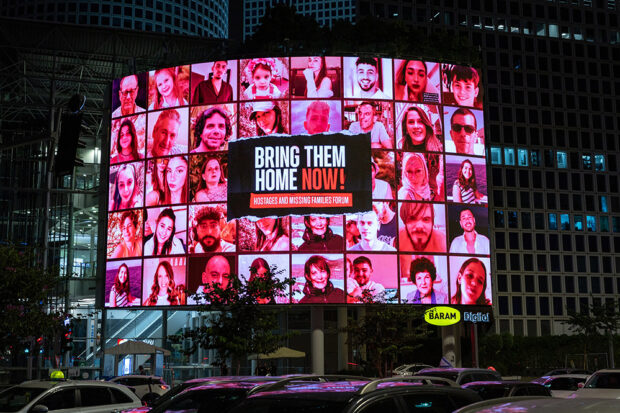

It is more than 100 days since the start of the Israel-Hamas war, and the daily news bulletins of destruction raise painful emotions. For me, it was an additional shock to learn from an article in a local newspaper that an Israeli cousin of mine was taken hostage on Oct. 7. His grandmother is a Holocaust survivor from Austria who immigrated to then-Palestine in 1947. She carries a poster with his picture at demonstrations.
My immediate family landed in the United States as refugees from Austria when I was young. Since my teens, I have been interested in avenues to international peace. As a college student, I returned to Austria for a summer job. When I met children of Nazis there, I became accustomed to having difficult conversations.
Some time later, living near San Francisco, I had several opportunities to speak with Palestinian Americans about their attitudes on Israel. Until then, I only understood Israel to be a safe haven for Jews escaping persecution and a land of opportunity for developing modern agriculture and industry. When Palestinian colleagues described their biblical roots there and their generations of family homes, now lost, I began to understand their experience and attitudes.
There is a way to acknowledge a different viewpoint than one’s own, without prejudice. I call it bifocal thinking. One part of one’s lens focuses on one’s own opinions and background. Another part of the lens is for making an effort to “get” what the other person’s aspirations and grievances are—without having to buy into them. This is different from immediately concluding who’s right and who’s wrong.
Bifocal thinking does not necessarily result in changing opinions, but it might facilitate a constructive interchange. For example, we don’t have to agree on everything in order to advocate for a ceasefire in the Middle East.
The Palestinian demonstration in Washington, D.C., promoting a ceasefire made a deep impression on me. Also, I find it valuable to follow a Jewish organization headquartered in Washington, D.C., called “J Street.” Recently, it has been advising President Biden on non-military actions and future paths for coexistence. The name of the group comes from the irony that there is no actual J Street among the alphabetically named streets of D.C.—but that street can be imagined, like a future peace.
It can only be hoped that wise leadership will emerge to end the present war. Israel is a democracy, and the current prime minister will likely be ousted in an election next year. His actions ignore the will of many, perhaps most, Israelis.
Meanwhile the horrific death toll in Gaza must be stopped. The beleaguered residents of Gaza will need to choose a new democratic governmental structure, as the United Nations has been suggesting. This will require more support from Arab neighbors. The enormity of what is now called “the day after” is hard to fathom, but history shows us that it will come.
The executive director of J Street, Nadiv Tamir, states that “we’ve witnessed an incomprehensible level of destruction and pain metered out on Palestinian civilians in Gaza. It’s been accompanied by truly disturbing, hate-filled rhetoric from members of the Netanyahu government, calling for wanton violence and destruction against families in Gaza who had no connection to the crimes of Hamas.”
Recently, J Street has been advising President Biden on non-military actions and future paths for coexistence.
As we go to press, Sen. Bernie Sanders (I–Vt.) is putting forward a resolution in Congress requiring that the State Department “report on potential human rights violations committed by Israel and evaluate the role that U.S.-supplied weapons have played in civilian deaths and injuries.”
More and more Israeli groups are also demanding a change in Netanyahu’s cruel policies. Although his term of office does not expire for a year and a quarter, early elections have been known to occur in Israel in some circumstances.
It cheers me up to remember a community that I got to know when visiting my relatives in Israel in the late 1900s. This group had developed a unique village where Israeli citizens of Jewish and Arabic descent could live among each other. They educated their children in a bilingual school (speaking both Hebrew and Arabic).
They named their village Neve Shalom/Wahat al Salaam. Their neighborly relations were good during better political times. In a social crisis, they struggle with their emotions separately.
One of their successes was a program for groups of older high school students from both ethnic groups to get acquainted and develop ideas for future peace. There was often sharing of ethnic food and jokes, easing tensions. Skilled leadership is needed for such a venture.
Difficult as it is, maintaining hope is vital for our spirits during the current crisis. I believe it is possible to cultivate hopefulness as a deliberate act. Children watch their parents and grandparents reacting to news of the war. We need to help them visualize a better future.
